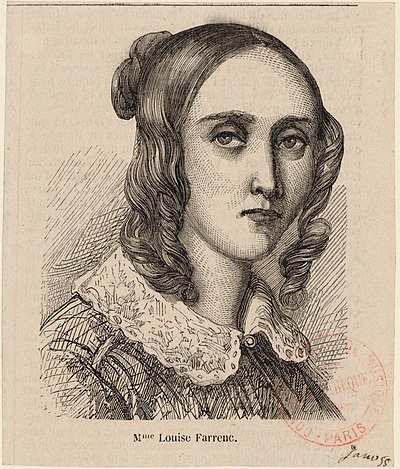by Jarrett Hoffman

•Tonight: Canton Symphony plays ABBA, and Oberlin faculty guitarist Stephen Aron in recital
•Les Délices is looking for an Executive Director
•The New Music Initiative for Black Voices invites submissions of string quartets from Black composers
•Emmet’s Place Education features saxophonist and woodwind doubler Alexa Tarantino
•Almanac: the chamber music of Louise Dumont Farrenc
HAPPENING TODAY:
There are two options, both at 7:30 pm. You can hear the music of ABBA in Canton, where the Canton Symphony will be joined by Jeans n’ Classics, an ensemble dedicated to bringing rock music to orchestras. Purchase tickets here.
Or you can head to Oberlin, where guitarist Stephen Aron will play music by John Dowland, Federico Moreno Torroba, Frédéric Chopin, Antonio Lauro, and Aron himself in Kulas Hall as part of the Conservatory’s faculty recital series. It’s free.
NEWS BRIEFS:
Les Délices has an opening for Executive Director, overseeing daily operations including fundraising, audience development, marketing, board communication, and financial management. More information here.
The New Music Initiative for Black Voices has extended its deadline until September 30. Black composers who are not under professional management are invited to submit their original string quartets, which will be evaluated by students at the McDuffie Center for Strings in Macon, Georgia. Apply for free here.
And Tri-C JazzFest has shared the latest webinar in the free Emmet’s Place Education series from pianist Emmet Cohen. This one features jazz saxophonist, woodwind doubler, composer, and educator Alexa Tarantino. Watch here, and browse all the offerings dating back to December 2021.

After highlighting Clara Schumann earlier this week, we now turn to another female pianist-composer of the 19th century: Louise Dumont Farrenc, who died on this date in Paris in 1875.
Farrenc built up a stellar reputation at the keyboard during the 1830s, leading to her appointment in 1842 as piano professor at the Paris Conservatory, a position in which she remained for 30 years — making her the only female tenured professor at the Conservatory during the entire 19th century.
As a composer, it was in chamber music where she left her strongest legacy. Her two piano quintets, Op. 30 and 31, were especially renowned, and she won the Académie des Beaux-Arts’ Chartier Prize twice.
Her chamber music even played an important role in helping her beat the gender pay gap. Despite being known as an excellent teacher, one of the best in Europe, she was paid less than her male colleagues — that is, until the triumphant premiere of her 1849 Nonet in E-flat, Op. 38, when she was finally granted equal pay.
One hundred and seventy-three years later, women still earn 17% less than men, according to the Harvard Business Review.



